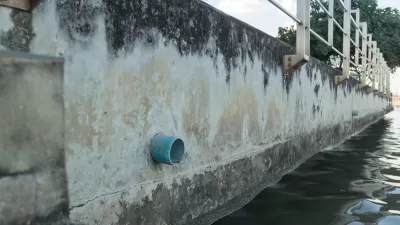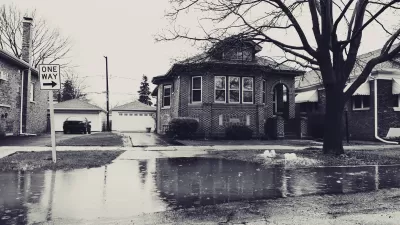A writer for the Tampa Bay Times critiques the city of St. Petersburg's response to repeat storm events that have sent millions of gallons of untreated wastewater into its public waters.

Charlie Frago writes of a recurring problem in St. Petersburg, Florida: rains overwhelming the city's wastewater system and sending millions of gallons of "untreated and partially treated sewage gushing into the waters of Tampa Bay and Boca Ciega Bay…"
Three-and-a-half million gallons of the previously described sewage overflowed the system in August 2015, prompting promises from elected officials that it wouldn't happen again. Yet along came Tropical Storm Colin in June 2016, causing "9.8 million of gallons of sewage — estimated to be 30 to 50 percent untreated sewage — [to spill] into the bay."
Frago critiques the efforts of the city to prevent ongoing sewage mishaps, summing up his assessment up with these excoriating words: "St. Petersburg had options. But the option officials chose was to do nothing." The feature-length article digs into the details of how the plan hatched after last August's storms fell short, and the additional measures that have since been added on to the city's stormwater emergency plans. For instance, the city is currently "conducting an 18-month study to determine where it needs to fix the leaky pipes that fill with rainwater during a storm, increasing the volume of waste that flows into the sewer plants."
FULL STORY: St. Petersburg had options during sewage crisis — so what happened?

Montreal Mall to Become 6,000 Housing Units
Place Versailles will be transformed into a mixed-use complex over the next 25 years.

Planetizen Federal Action Tracker
A weekly monitor of how Trump’s orders and actions are impacting planners and planning in America.

DARTSpace Platform Streamlines Dallas TOD Application Process
The Dallas transit agency hopes a shorter permitting timeline will boost transit-oriented development around rail stations.

Interactive Map Reveals America's “Shade Deserts”
Launched by UCLA and American Forests to combat heat-related deaths, the tool maps the shade infrastructure for over 360 U.S. cities.

Bicycles and Books — In Sacramento, Libraries Now Offer Both
Adult library card holders can check out e-bikes and e-trikes for up to one week.

Colorado Landfills Emit as Much Pollution as 1M Cars
Landfills are the third-largest source of methane pollution in Colorado, after agriculture and fossil fuel extraction.
Urban Design for Planners 1: Software Tools
This six-course series explores essential urban design concepts using open source software and equips planners with the tools they need to participate fully in the urban design process.
Planning for Universal Design
Learn the tools for implementing Universal Design in planning regulations.
City of Mt Shasta
City of Camden Redevelopment Agency
City of Astoria
Transportation Research & Education Center (TREC) at Portland State University
US High Speed Rail Association
City of Camden Redevelopment Agency
Municipality of Princeton (NJ)





























